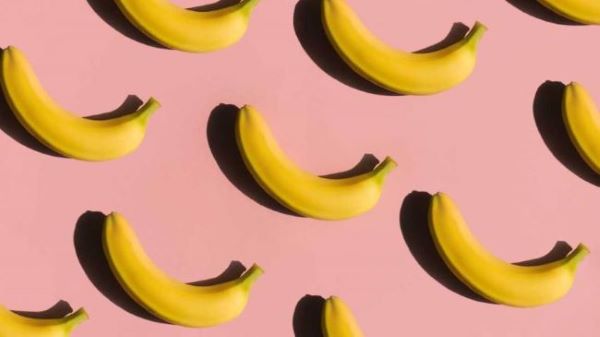The Official (Unofficial) Banana Website
An Officially Unofficial Site for Those Who Love the Yellow Fruit
What are Bananas?
A banana is an elongated, edible fruit – botanically a berry – produced by several kinds of large herbaceous flowering plants in the genus Musa. In some countries, bananas used for cooking may be called "plantains", distinguishing them from dessert bananas. The fruit is variable in size, color, and firmness, but is usually elongated and curved, with soft flesh rich in starch covered with a rind, which may be green, yellow, red, purple, or brown when ripe.
Worldwide, there is no sharp distinction between "bananas" and "plantains". Especially in the Americas and Europe, "banana" usually refers to soft, sweet, dessert bananas, particularly those of the Cavendish group, which are the main exports from banana-growing countries. By contrast, Musa cultivars with firmer, starchier fruit are called "plantains". In other regions, such as Southeast Asia, many more kinds of banana are grown and eaten, so the binary distinction is not as useful and is not made in local languages.
The term "banana" is also used as the common name for the plants that produce the fruit. This can extend to other members of the genus Musa, such as the scarlet banana (Musa coccinea), the pink banana (Musa velutina), and the Fe'i bananas. It can also refer to members of the genus Ensete, such as the snow banana (Ensete glaucum) and the economically important false banana (Ensete ventricosum). Both genera are in the banana family, Musaceae.

What are the Health Benefits of Bananas?
Raw bananas (not including the peel) are 75% water, 23% carbohydrates, 1% protein, and contain negligible fat. A 100-gram reference serving supplies 89 Calories, 31% of the US recommended Daily Value (DV) of vitamin B6, and moderate amounts of vitamin C, manganese and dietary fiber, with no other micronutrients in significant content (see table).
Although bananas are commonly thought to contain exceptional potassium content, their actual potassium content is not high per typical food serving, having only 8% of the US recommended Daily Value for potassium (considered a low level of the DV, see nutrition table), and their potassium-content ranking among fruits, vegetables, legumes, and many other foods is relatively moderate. Vegetables with higher potassium content than raw dessert bananas (358 mg per 100 g) include raw spinach (558 mg per 100 g), baked potatoes without skin (391 mg per 100 g), cooked soybeans (539 mg per 100 g), grilled portabella mushrooms (437 mg per 100 g), and processed tomato sauces (413–439 mg per 100 g). Raw plantains contain 499 mg potassium per 100 g. Dehydrated dessert bananas or banana powder contain 1491 mg potassium per 100 g.
Why I Like Bananas?
- They taste good.
- They have a nice color.
- They are healthy.
Why Everyone Should Like Bananas?
- See "Why I like Bananas?"
- Banana phone